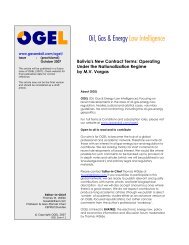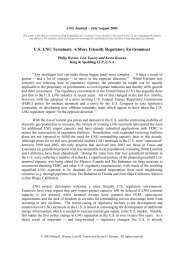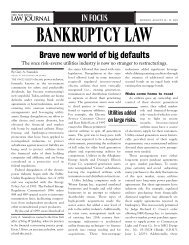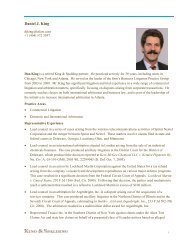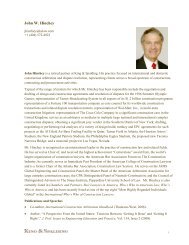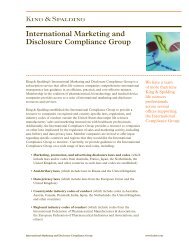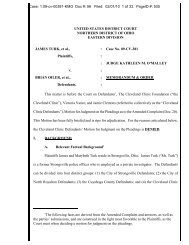Due Diligence Review: M&A Behind the Scenes - King & Spalding
Due Diligence Review: M&A Behind the Scenes - King & Spalding
Due Diligence Review: M&A Behind the Scenes - King & Spalding
You also want an ePaper? Increase the reach of your titles
YUMPU automatically turns print PDFs into web optimized ePapers that Google loves.
MANAGEMENTduediligence<br />
particularly <strong>the</strong> case where <strong>the</strong>re might be uncertainty, for<br />
instance due to competition authority referrals.<br />
In friendly bids <strong>the</strong>re is an opportunity for <strong>the</strong> acquirer to<br />
meet and interview <strong>the</strong> target company’s management team to<br />
determine who should be retained and what roles <strong>the</strong>y should<br />
be considered for. Consultants can also be engaged to work<br />
with <strong>the</strong> acquirer to design new management structures and to<br />
assess candidates. This assessment can include individual psychological<br />
evaluation as well as consideration of team dynamics<br />
to ensure that <strong>the</strong> new management team can work toge<strong>the</strong>r<br />
effectively.<br />
A typical approach to this kind of assessment is to identify<br />
<strong>the</strong> competencies required for each role and for <strong>the</strong> management<br />
team as a whole, and to profile individuals against<br />
requirements using information in CVs and appraisals as well<br />
as bonus history etc.<br />
This more thorough approach to selecting <strong>the</strong> management<br />
team may not be possible at due diligence stage, for example,<br />
because <strong>the</strong> deal is subject to regulatory approval and companies<br />
are unable to exchange information. This is very similar to a hostile<br />
bid situation although it should be noted that independent<br />
firms are sometimes asked to undertake data ga<strong>the</strong>ring from <strong>the</strong><br />
merging organisations and to hold <strong>the</strong> confidential information in<br />
escrow and only to release it if <strong>the</strong> deal is approved.<br />
Hostile bids<br />
In hostile bids <strong>the</strong> acquirer has no ready access to information<br />
about employees. Many acquirers will simply review what is<br />
available through annual reports etc. However, headhunting<br />
firms will undertake ‘referencing’ studies and conduct search<br />
assignments, asking knowledgeable people in <strong>the</strong> sector for<br />
views on particular ‘candidates’ and researching all <strong>the</strong> information<br />
<strong>the</strong>y can find.<br />
It has even been known for potential acquirers to take this activity<br />
fur<strong>the</strong>r and to undertake almost covert intelligence ga<strong>the</strong>ring<br />
on <strong>the</strong> individuals at <strong>the</strong> top of <strong>the</strong> target company.<br />
In many hostile bids <strong>the</strong> acquirer relies on published information<br />
and very limited commercial due diligence to make decisions<br />
on price, and assesses <strong>the</strong> management team at a later stage.<br />
Why leadership issues are so important<br />
Mercer’s research into people issues in M&A confirmed four<br />
basic leadership requirements for merger success:<br />
• Timeliness and speed of top appointments<br />
• The appointment of honest, straightforward leaders<br />
• The ability of <strong>the</strong> leadership to prioritise in a complex and<br />
changing environment<br />
• Clarity of purpose with effective and quick decisions<br />
We also found that <strong>the</strong> ability of <strong>the</strong> team to work toge<strong>the</strong>r was<br />
as important as <strong>the</strong> individual talent of selected team members.<br />
A culture audit questionnaire can be completed by managers of<br />
<strong>the</strong> merging organisations to identify <strong>the</strong>ir historical business cultures,<br />
and help assess <strong>the</strong> potential for ‘culture clash’. This can be<br />
followed up with facilitated discussions about <strong>the</strong> desired culture<br />
and values that will drive <strong>the</strong> new organisation. Classic gap<br />
analysis and identifying an action plan follow. It is sometimes<br />
possible to identify <strong>the</strong> issues at due diligence, even if access to<br />
<strong>the</strong> target’s management is limited.<br />
Psychological assessment<br />
The benefits of assessing management team members by sophisticated<br />
interviewing, assessment centre and psychometric tests is<br />
now widely recognised. They are invaluable as tools to support<br />
individual coaching or team building. There is still some reluctance<br />
to use <strong>the</strong>m in merger situations, where emotional issues<br />
can get in <strong>the</strong> way of objective assessment.<br />
However, <strong>the</strong>se approaches are generally more effective than<br />
relying on reputation or hastily conducted interviews.<br />
There are a range of aptitude tests to assess numerical, verbal<br />
and o<strong>the</strong>r abilities, but <strong>the</strong>se skills are usually assumed to be adequate<br />
in successful managers. Emotional intelligence and <strong>the</strong><br />
ability to work effectively as a top team member are now recognised<br />
as <strong>the</strong> differentiators of effective top management performance.<br />
A range of tools exist to support assessments of<br />
‘occupational personality’. These tools, when used by suitably<br />
qualified consultants, can greatly support decision makers and<br />
help individuals recognise how <strong>the</strong>y can contribute best to <strong>the</strong><br />
management team.<br />
Increasingly, deals are being questioned on <strong>the</strong> ‘soft’ issues,<br />
even where <strong>the</strong> numbers seem to work. This is because deal<br />
makers now understand that most mergers fail to deliver <strong>the</strong><br />
expected value, and this is usually due to a failure to address cultural<br />
issues.<br />
The risks and costs of losing key leaders, managers or teams far<br />
outweigh <strong>the</strong> short-term costs of identifying and retaining those<br />
people who will ensure <strong>the</strong> overall success of a merger. Careful<br />
due diligence and appreciation of <strong>the</strong> softer issues in M&As will<br />
help to make sure <strong>the</strong> deal creates value for both <strong>the</strong> organisation<br />
and shareholders.<br />
Peter Wallum is Head of UK Mergers and Acquisitions at Mercer Human<br />
Resource Consulting.<br />
16 FW <strong>Due</strong> <strong>Diligence</strong> <strong>Review</strong>: M&A <strong>Behind</strong> <strong>the</strong> <strong>Scenes</strong> 2004 | www.financierworldwide.com







